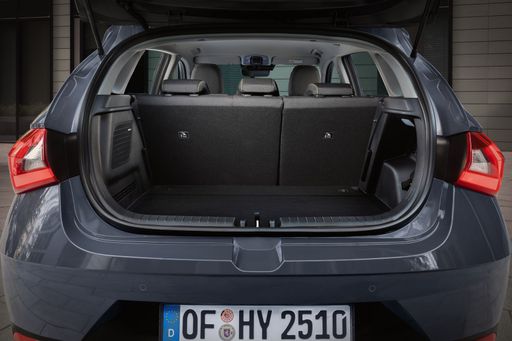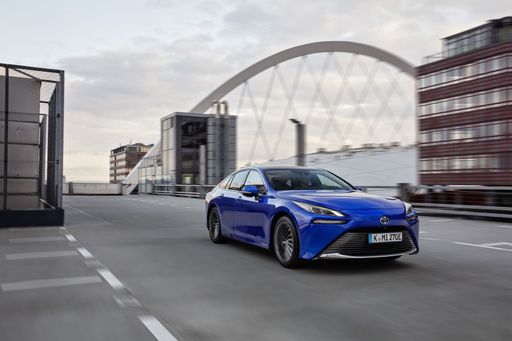Hyundai i20 VS Toyota Mirai – Specs, Efficiency & Price Comparison
Which model is the better choice – the Hyundai i20 or the Toyota Mirai? We compare performance (100 HP vs 182 HP), boot capacity (352 L vs 300 L), efficiency (5.20 L vs ), and of course, the price (17400 £ vs 58700 £).
Find out now which car fits your needs better!
The Hyundai i20 (Hatchback) is powered by a Petrol MHEV or Petrol engine and comes with a Automatic or Manuel transmission. In comparison, the Toyota Mirai (Sedan) features a Hydrogen engine and a Automatic gearbox.
When it comes to boot capacity, the Hyundai i20 offers 352 L, while the Toyota Mirai provides 300 L – depending on what matters most to you. If you’re looking for more power, you’ll need to decide whether the 100 HP of the Hyundai i20 or the 182 HP of the Toyota Mirai suits your needs better.
There are also differences in efficiency: 5.20 L vs . In terms of price, the Hyundai i20 starts at 17400 £, while the Toyota Mirai is available from 58700 £.
Compare all the key specs now and find out which model fits your lifestyle best!
Hyundai i20
The Hyundai i20 impresses with its sleek design and modern aesthetics, making it a stylish choice in the compact car segment. Its interior is thoughtfully designed, offering comfort and advanced technology for a pleasurable driving experience. The vehicle also stands out with its efficient performance and agile handling, making city driving a breeze.
details @ hyundai.news
@ hyundai.news
 @ hyundai.news
@ hyundai.news
 @ hyundai.news
@ hyundai.news
 @ hyundai.news
@ hyundai.news
 @ hyundai.news
@ hyundai.news
Toyota Mirai
The Toyota Mirai represents a groundbreaking step in hydrogen fuel cell technology, offering an eco-friendly alternative to traditional petrol engines. Its sleek design and futuristic aesthetic make it a standout on the road, while the interior combines comfort with cutting-edge features. With its impressive range and quick refuelling capabilities, the Mirai is paving the way for the future of sustainable motoring.
details @ Toyota
@ Toyota

|

|
|
|
|
Costs and Consumption |
|
|---|---|
|
Price
17400 - 24000 £
|
Price
58700 - 66700 £
|
|
Consumption L/100km
5.2 - 5.3 L
|
Consumption L/100km
-
|
|
Consumption kWh/100km
-
|
Consumption kWh/100km
-
|
|
Electric Range
-
|
Electric Range
650 km
|
|
Battery Capacity
-
|
Battery Capacity
-
|
|
co2
119 - 121 g/km
|
co2
-
|
|
Fuel tank capacity
40 L
|
Fuel tank capacity
5 L
|
Dimensions and Body |
|
|---|---|
|
Body Type
Hatchback
|
Body Type
Sedan
|
|
Seats
5
|
Seats
5
|
|
Doors
5
|
Doors
4
|
|
Curb weight
1088 - 1190 kg
|
Curb weight
1900 - 1930 kg
|
|
Trunk capacity
352 L
|
Trunk capacity
300 L
|
|
Length
4065 - 4075 mm
|
Length
4975 mm
|
|
Width
1775 mm
|
Width
1885 mm
|
|
Height
1450 - 1455 mm
|
Height
1470 mm
|
|
Payload
450 - 472 kg
|
Payload
485 - 515 kg
|
Engine and Performance |
|
|---|---|
|
Engine Type
Petrol MHEV, Petrol
|
Engine Type
Hydrogen
|
|
Transmission
Automatic, Manuel
|
Transmission
Automatic
|
|
Transmission Detail
Automat. Schaltgetriebe (Doppelkupplung), Schaltgetriebe
|
Transmission Detail
-
|
|
Drive Type
Front-Wheel Drive
|
Drive Type
Rear-Wheel Drive
|
|
Power HP
79 - 100 HP
|
Power HP
182 HP
|
|
Acceleration 0-100km/h
11.1 - 13.7 s
|
Acceleration 0-100km/h
9.20 s
|
|
Max Speed
166 - 183 km/h
|
Max Speed
175 km/h
|
|
Torque
113 - 200 Nm
|
Torque
300 Nm
|
|
Number of Cylinders
3 - 4
|
Number of Cylinders
-
|
|
Power kW
58 - 74 kW
|
Power kW
134 kW
|
|
Engine capacity
998 - 1197 cm3
|
Engine capacity
-
|
General |
|
|---|---|
|
Model Year
2024
|
Model Year
2021 - 2022
|
|
CO2 Efficiency Class
D
|
CO2 Efficiency Class
-
|
|
Brand
Hyundai
|
Brand
Toyota
|
Hyundai i20
Introducing the Hyundai i20: A Blend of Style and Efficiency
The Hyundai i20 has been a favourite in the subcompact car segment, loved for its innovative features and reliable performance. In its latest versions, the i20 continues to impress with a perfect balance of aesthetics and functionality. Below, we dive into the technical details that make the Hyundai i20 a compelling choice for modern drivers.
Powertrain and Efficiency: Where Performance Meets Economy
The Hyundai i20 lineup offers an array of engine options, ranging from a 1.0-litre T-GDI petrol engine to the energetic 1.0-litre T-GDI 48V hybrid. These engines generate between 100 PS to a remarkable 204 PS in the N Performance variant. The incorporation of a mild-hybrid system improves fuel efficiency, with consumption as low as 5.1 L/100 km.
With both automatic and manual transmissions available, drivers can enjoy crisp gear shifts and a smooth driving experience. Front-wheel drive ensures nimble handling, making city and motorway drives equally enjoyable.
Design: Compact in Form, Grand in Appearance
The Hyundai i20 showcases a sleek hatchback design with dimensions that perfectly blend urban agility with interior spaciousness. Measuring between 4065 mm to 4075 mm in length, and with a width of 1775 mm, it offers a roomy cabin while maintaining a compact silhouette. The bold grille and stylish LED headlights contribute to its modern, athletic look.
Advanced Features and Technology
Innovation is at the heart of the Hyundai i20's appeal. It comes equipped with an impressive suite of technological features designed to enhance the driving experience. This includes a state-of-the-art infotainment system, which provides seamless connectivity through both Apple CarPlay and Android Auto.
The Hyundai SmartSense package is offered for peace of mind, with a suite of safety features like Forward Collision-Avoidance Assist and Lane Keeping Assist. These technologies ensure that you stay safe and in control, whether navigating city streets or hitting the open road.
Performance Variants: The Hyundai i20 N
For those who crave thrill, the i20 N variant doesn't disappoint. With 204 PS and a 6.2-second acceleration from 0 to 100 km/h, this hot hatch is designed for pure driving pleasure. It features an enhanced suspension setup and a range of performance-focused enhancements.
The i20 N embodies a spirit of adventure with its distinctive design cues and sporting credentials, perfect for enthusiasts who appreciate both performance and aesthetics.
Interior Comfort and Practicality
The interior of the Hyundai i20 is equally striking, with high-quality materials and a thoughtful layout that prioritises driver comfort and convenience. The cabin comfortably seats five passengers, while the boot offers a generous 352 litres of luggage space.
With an array of trim levels available, including N-Line and Prime, buyers can tailor the i20 to their tastes, ensuring they enjoy both luxury and practicality.
Final Thoughts: A Car Built for Modern Needs
The Hyundai i20 is more than just a car; it's a statement of style, efficiency, and innovation. Whether you're navigating busy urban streets or embarking on a road trip, the i20 is designed to meet the needs of contemporary drivers. With its range of engines, innovative features, and stylish design, the Hyundai i20 stands out in its class as a well-rounded and highly appealing choice.
Toyota Mirai
The Future of Driving: Introducing the Toyota Mirai
The Toyota Mirai represents a significant leap forward in automotive innovation, being one of the leading vehicles in the hydrogen fuel cell market. As we continue to search for sustainable transportation solutions, the Mirai stands out with its pioneering technology and exceptional driving features.
Revolutionary Hydrogen Fuel Cell Technology
At the heart of the Toyota Mirai is its groundbreaking hydrogen fuel cell system. Unlike conventional internal combustion engines, the Mirai uses a fuel cell stack to generate electricity through the chemical reaction between hydrogen and oxygen. This process not only powers the car with zero emissions—producing only water vapour as a byproduct—but also delivers a smooth and silent drive.
Technical Specifications and Performance
The Toyota Mirai is designed with performance in mind. It boasts a power output of 182 PS (134 kW) and delivers a robust 300 Nm of torque, allowing it to accelerate from 0 to 100 km/h in just 9.2 seconds. While its top speed is a respectable 175 km/h, it's the Mirai's impressive range that really stands out. The vehicle can travel up to 650 km on a single hydrogen fill-up, making it a practical choice for long-distance travel.
Sophisticated Design and Comfort
Designed as a saloon, the Toyota Mirai combines aesthetic appeal with comfort. Its dimensions—4975 mm in length, 1885 mm in width, and 1470 mm in height—provide a spacious interior for five passengers. The design is sleek and modern, reflecting its advanced engineering. The boot offers 300 litres of storage, suitable for everyday needs.
Advanced Features and Safety
The Toyota Mirai doesn't just excel in propulsion technology; it also includes a range of advanced features to enhance driver comfort and safety. Available in three trims—Advanced, Executive, and Luxury—the Mirai includes state-of-the-art safety systems and infotainment options to ensure a connected and secure driving experience.
Cost and Efficiency
While the price of the Toyota Mirai ranges from €65,990 to €76,290, its monthly running costs—estimated between €1,496 and €1,672—and per kilometre costs of 59.9 to 66.9 cents, reflect the efficient nature of hydrogen-powered vehicles. Considering its innovative technology, the Toyota Mirai offers excellent value for those looking to invest in the future of eco-friendly transport.
The Toyota Mirai: Driving Towards a Sustainable Future
Overall, the Toyota Mirai is more than just a car; it's a vision for the future of sustainable transportation. With its cutting-edge hydrogen fuel cell technology, impressive range, and commitment to zero-emissions driving, the Mirai sets a new standard in environmentally conscious car design. Whether you're an eco-enthusiast or just someone seeking a reliable and technological advanced vehicle, the Toyota Mirai is worth considering.
The prices and data displayed are estimates based on German list prices and may vary by country. This information is not legally binding.
